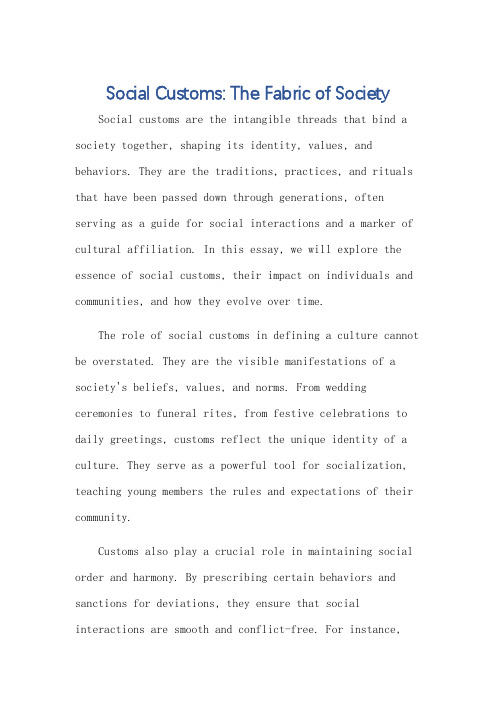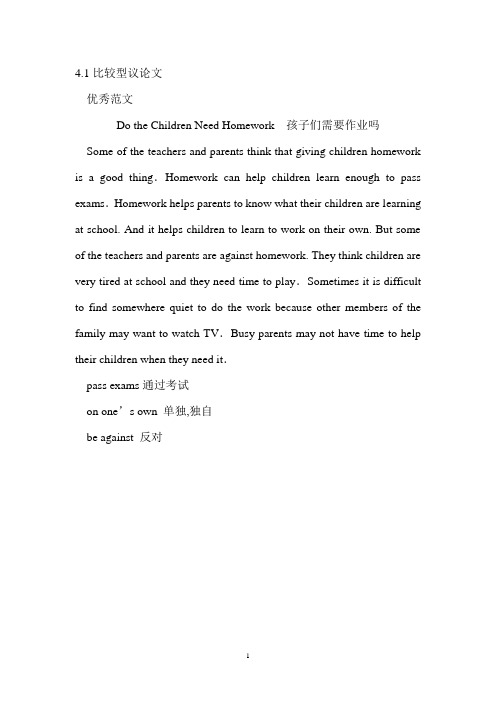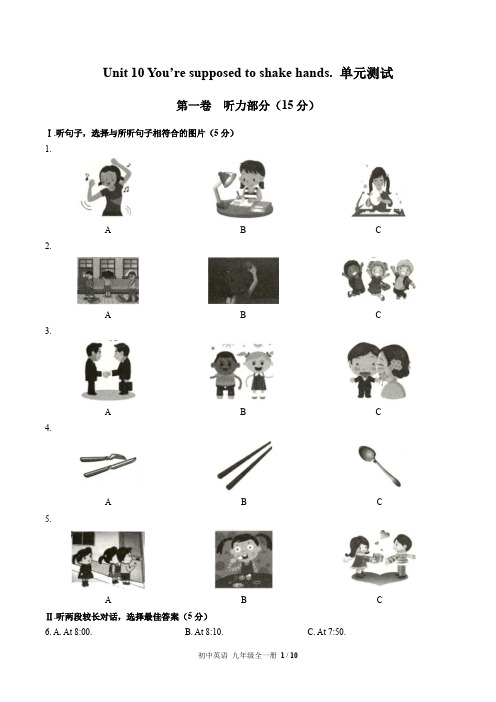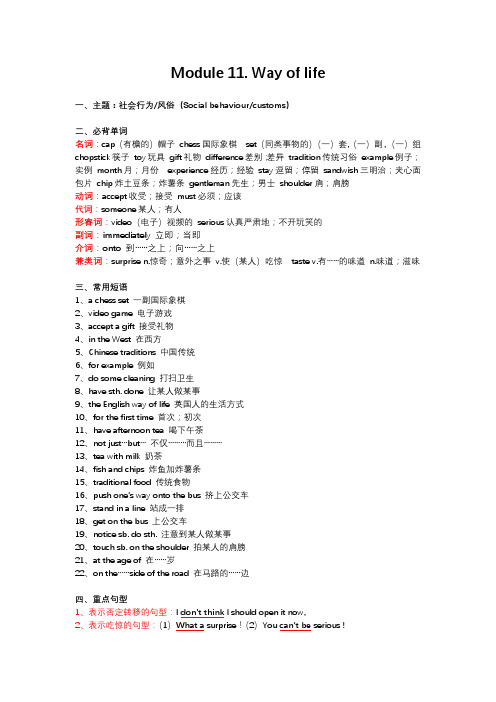社会习俗与行为(Social Customs and Behavior)
魔法英语初中作文秀比较型议论文

比较型议论文优秀范文Do the Children Need Homework孩子们需要作业吗Some of the teachers and parents think that giving children homework is a good thing.Homework can help children learn enough to pass exams.Homework helps parents to know what their children are learning at school. And it helps children to learn to work on their own. But some of the teachers and parents are against homework. They think children are very tired at school and they need time to play.Sometimes it is difficult to find somewhere quiet to do the work because other members of the family may want to watch TV.Busy parents may not have time to help their children when they need it.pass exams通过考试on one’s own 单独,独自be against 反对We Need to Take Exercise我们需要锻炼身体Some people go to bed late at night and get up late in the morning.This is not good for them.We must sleep at night when it is dark.The darkness helps us to sleep properly.When the daylight comes,we must get up.This is the time for exercise.Exercise means doing things with the body. Exercise keeps it strong.Exercise helps the blood to move around inside the body.Blood takes food to all parts of our bodies.The brains in our heads also need blood.We think with our brains.If we keep our bodies healthy,and take exercise,we can think better!This is the time for exercise. 到锻炼身体的时候了。
韦伯四种社会行为举例

韦伯四种社会行为举例韦伯的社会行为理论包括四种社会行为类型:传统行为、情感行为、价值合理行为和目的合理行为。
这些社会行为类型是在韦伯对社会行为的观察和研究基础上提出来的,它们帮助我们更好地理解和解释不同的社会行为。
下面将分别针对这四种社会行为类型进行举例说明,并探讨一些相关参考内容。
1. 传统行为(Traditional Behavior)传统行为是指基于传统、惯例和保持传统的动机而进行的行为。
它们通常是出于历史、宗教、习俗或惯例的目的而进行的行为。
举例一:节日庆祝在传统行为的范畴中,人们在节日期间如春节、圣诞节和万圣节等庆祝活动中展示出具有传统特色的行为,比如戴红色的饰品、烘焙传统食物和进行特定的仪式活动。
这些行为是基于对传统的尊重和继承,以保持社会团结和文化传承为目的。
参考内容:传统行为的维持与改变传统行为随着社会发展和变迁而发生演变。
在一些传统节日的庆祝仪式中,人们会结合现代科技和娱乐方式,进行创新和变革,以吸引年轻一代的参与和关注。
这一现象反映了传统行为的动态性和适应性,也突显了传统文化与现代社会的互动关系。
2. 情感行为(Affective Behavior)情感行为是指受到个人内在动机、情感状态或群体情绪的驱动而进行的行为。
它们通常表达个体或群体的情感、情绪或喜好等,并通过这些行为来影响他人或加强群体凝聚力。
举例二:示威游行示威游行是一种常见的情感行为。
人们通过游行、举牌和集会等方式,表达对某一政策、社会问题或价值观的赞成或反对。
示威游行既是个体的情感宣泄,也是一种对公众意见和政府决策产生影响的行为。
参考内容:情感行为的影响与激励情感行为的目的通常是通过表达情感来激励他人或争取支持,其社会影响力不容忽视。
政府和组织可以通过理解和引导情感行为,来更好地管理公众情绪,调动群体积极性,以实现社会稳定和组织目标。
3. 价值合理行为(Value-rational Behavior)价值合理行为是指基于个体内部价值观、意义体系或道德准则的动机而进行的行为。
四年级作文:Social customs(社会习俗)

四年级作文:Social customs(社会习俗)Social customs differ in different parts of the world。
If we don;t realize this, misunderstanding may arise between people that behave differently。
In the United States, people are very informal in social situations。
For example, they call each other by their given names when two people first meet。
So do the young to the old。
In China, it would be regarded quite impolite to do so。
Another difference is about what can be talked about in a conversation。
A Chinese thinks nothing of being asked how much his coat cost while Americans think it impolite to ask such a question。
A Chinese woman doesn;t care if she is asked about her age。
Politics,religions, as well as incomes are often talked about among Chinese。
But in the United States these kinds of subjects are usually avoided in conversation。
社会习俗英语作文

社会习俗英语作文Every culture has its own customs and traditions, and in this modern age, it is important to understand and respect the social customs of different societies. Understanding the social customs of a particular society can help people to navigate social situations and avoid inadvertently offending others.每种文化都有其自己的风俗和传统,在这个现代社会中,理解和尊重不同社会的社会风俗是非常重要的。
了解某个特定社会的社会风俗可以帮助人们应对社交场合,并避免无意中冒犯他人。
One example of social custom is the concept of "face" in Chinese culture. "Face" represents a person's reputation, dignity, and prestige, and it is crucial to maintain "face" in social interactions. This can manifest in various ways, such as being mindful of giving and receiving compliments, respecting elders and those in authority, and avoiding public displays of emotion or confrontation. The concept of "face" plays a significant role in shaping social relationships and influencing behavior in Chinese society.一个例子就是中国文化中的"面子"概念。
社会习俗英语作文

Social Customs: The Fabric of SocietySocial customs are the intangible threads that bind a society together, shaping its identity, values, and behaviors. They are the traditions, practices, and rituals that have been passed down through generations, often serving as a guide for social interactions and a marker of cultural affiliation. In this essay, we will explore the essence of social customs, their impact on individuals and communities, and how they evolve over time.The role of social customs in defining a culture cannot be overstated. They are the visible manifestations of a society's beliefs, values, and norms. From wedding ceremonies to funeral rites, from festive celebrations to daily greetings, customs reflect the unique identity of a culture. They serve as a powerful tool for socialization, teaching young members the rules and expectations of their community.Customs also play a crucial role in maintaining social order and harmony. By prescribing certain behaviors and sanctions for deviations, they ensure that social interactions are smooth and conflict-free. For instance,customs related to dress codes,餐桌礼仪, and greetings establish a common language of respect and civility among members of a society.However, social customs are not static; they evolve and transform over time. This evolution can be triggered by various factors such as technological advancements, migrations, and globalization. For instance, the advent of the internet and social media has changed the way people celebrate festivals, with virtual events and online gatherings becoming commonplace. Similarly, migrations have led to the blending of customs and traditions, giving riseto new hybrid cultures.The impact of social customs on individuals is profound. They shape individuals' identity, values, and behaviors. While customs can provide a sense of belonging andstability, they can also be restrictive, limitingindividuals' freedom and expression. This tension between tradition and individuality is a recurring theme in many cultures, leading to debates and conflicts about the roleof customs in modern society.In conclusion, social customs are an integral part of human society, playing a crucial role in defining culture, maintaining social order, and shaping individual identity. While they may vary across cultures and change over time, their fundamental purpose remains the same: to bind people together and create a shared sense of purpose and belonging. Understanding and respecting these customs is essential for promoting harmonious social interactions and fostering cultural understanding and tolerance.**社会习俗:社会的织锦**社会习俗是无形的纽带,将社会紧紧相连,塑造其身份、价值观和行为。
比较型议论文

4.1比较型议论文优秀范文Do the Children Need Homework 孩子们需要作业吗Some of the teachers and parents think that giving children homework is a good thing.Homework can help children learn enough to pass exams.Homework helps parents to know what their children are learning at school. And it helps children to learn to work on their own. But some of the teachers and parents are against homework. They think children are very tired at school and they need time to play.Sometimes it is difficult to find somewhere quiet to do the work because other members of the family may want to watch TV.Busy parents may not have time to help their children when they need it.pass exams通过考试on one’s own 单独,独自be against 反对We Need to Take Exercise 我们需要锻炼身体Some people go to bed late at night and get up late in the morning.This is not good for them.We must sleep at night when it is dark.The darkness helps us to sleep properly.When the daylight comes,we must get up.This is the time for exercise.Exercise means doing things with the body.Exercise keeps it strong.Exercise helps the blood to move around inside the body.Blood takes food to all parts of our bodies.The brains in our heads also need blood.We think with our brains.If we keep our bodies healthy,and take exercise,we can think better!This is the time for exercise. 到锻炼身体的时候了。
外研版八年级英语上册Module 11讲义(含导入及详细知识点)

M o d ule 11.Way of l i fe一、主题:社会行为/风俗(Soc ial behaviour/custo ms)二、必背单词名词:cap(有檐的)帽子 chess国际象棋se t(同类事物的)(一)套,(一)副,(一)组chopst i ck筷子 toy玩具g i f t礼物 di f fe rence 差别;差异t rad i t ion 传统习俗exa mple例子;实例month 月;月份exper ience 经历;经验 s tay逗留;停留 sandwish三明治;夹心面包片ch ip炸土豆条;炸薯条gent l e man 先生;男士 shou lder肩;肩膀动词:accept收受;接受must必须;应该代词:so meone 某人;有人形容词:v ideo(电子)视频的 serious认真严肃地;不开玩笑的副词:im mediat e ly立即;当即介词:onto 到……之上;向……之上兼类词:surpr i se n.惊奇;意外之事 v.使(某人)吃惊tas te v.有……的味道n.味道;滋味三、常用短语1、a chess se t一副国际象棋2、v ideo ga me 电子游戏3、accept a g i f t接受礼物4、in the West在西方5、Chinese t rad i t i ons中国传统6、for exa mple例如7、do so me c leaning 打扫卫生8、have s th. done 让某人做某事9、the Eng l i sh way o f l i fe英国人的生活方式10、for the f i r s t t i m e 首次;初次11、have a f te rnoon tea喝下午茶12、not jus t…but…不仅………而且………13、tea w i th mi lk 奶茶14、f i sh and ch ips炸鱼加炸薯条15、t rad i t iona l food 传统食物16、push one’s way onto the bus挤上公交车17、stand in a l ine 站成一排18、get on the bus上公交车19、not ice sb. do s th.注意到某人做某事20、touch sb. on the shou lder拍某人的肩膀21、at the age of 在……岁22、on the……s ide of the road 在马路的……边四、重点句型1、表示否定转移的句型:I don’t t hink I shou ld open i t now,2、表示吃惊的句型:(1)W hat a su rp r i se!(2)You can’t be ser ious!3、提出建议的句型:(1)And you mustn’t break anyth ing.(2)And you’d better not haveyour ha i r cut dur ing the Spr ing Fes t i va lm o nth.(3)Let’s ce lebrate L ing l ing’s b i r t hday f i r s t!五、模块语法情态动词 must、can 和 need 的用法(You must say Mr or Mrs when you meet so meone for the f i r s t t ime./You can take i t away./ You needn’t wa i t!)M o d ule 11.W a y of l i fe详细笔记1.Here’s your g i f t.这是给你的礼物。
(人教版)初中英语九年级 Unit 10单元测试01(含答案)

Unit 10 You’re supposed to shake hands. 单元测试第一卷听力部分(15分)Ⅰ.听句子,选择与所听句子相符合的图片(5分)1.A B C2.A B C3.A B C4.A B C5.A B C Ⅱ.听两段较长对话,选择最佳答案(5分)6. A. At 8:00. B. At 8:10. C. At 7:50.7. A. To bow. B. To kiss. C. To shake hands.8. A. Different opinions about time in different countries.B. People in Colombia like to be on time.C. People in Switzerland are relaxed about time.9. A. Visiting a factory. B. Giving a talk. C. Having a holiday.10. A. Lucy’s. B. Lily’s. C. Linda’s.Ⅲ.所短文,完成表格信息。
每空一词(5分)第二卷笔试部分(85分)Ⅳ.单项选择(10分)16.—Do you often ________ your friends’ homes on your way home?—Yes, we do.A. drop byB. visit toC. come atD. come over17. Don’t point ________ anyone _________ your chopsticks. It’s not polite.A. at; byB. at; withC. to; byD. to; with18.—All the workers went home yesterday ________ Mr White. Why?—Because he was on duty.A. besideB. besidesC. exceptD. but19. The restaurant owner ________ his way to see if all his guests are well satisfied.A. gets outB. goes outC. get out ofD. goes out of20.—The basket is ________ Will you please help me fill it with apples?—My pleasure.A. emptyB. StrangeC. brokenD. full21.—You’ve given us a wonderful Chinese dinner, Mrs Wang.—________.A. Oh, I’m afraid I didn’t cook very wellB. I’m glad you enjoyed itC. Come again when you are freeD. It’s not necessary for you to say so22. After ________ for a while, the whole building fell down.A. bowingB. bendingC. wipingD. shaking23. If you get into trouble, you can ________ your teacher ________ help.A. turn; toB. ask; forC. help; withD. look; for24. He ________ eat much junk food, but now he ________ eating lots of vegetables and fruit.A. used to; used toB. was used to; used toC. used to; is used toD. is used to; used to25.—I’ve put on ten pounds.—You should ________ to take more exercise every day.A. make sure ofB. make a plan forC. make a suggestionD. make an effortⅤ.完形填空(10分)What is rude and what is polite is different in different countries. Some things that many Chinese people do can be considered rude or not 26 in western countries. Here is some advice on what not to say or do. Let’s 27 .In business settings, one should never 28 a foreigner a cigarette. Smoking kills. Don’t kill anyone. That is true, and it smells very bad. Please don’t smoke!29 get angry at someone for going Dutch(各自付款) and 30 the bill when you eat out. In the west, it shows equal(平等的) respect. Try going Dutch. It is cheaper, and it shows equality. When eating dinner in Norway and the United States, it is polite to 31 everything on your plate to show that you enjoy the food.32 in some countries, it is polite to leave some of the food on your plate.Don’t use bad 33 at work. Even though some famous people use them, bad words are a sign of a bad education. Bad words should be used 34 or not at all.If you have to spit, clear your nose or clean your ears and do it in the bathroom where no one can 35 you. Don’t be a RUDE person at your office or in public.26. A. polite B. important C. particular D. pleased27. A. have a rest B. have a look C. have a try D. have a talk28. A. pick B. sell C. offer D. point29. A. Always B. Never C. Sometimes D. Often30. A. pay B. keep C. share D. take31. A. leave off B. take away C. put off D. eat up32. A. And B. But C. So D. Because33. A. words B. sentences C. passages D. texts34. A. as much as possible B. as little as possible C. as often as possible D. as soon as possible35. A. stop B. prevent C. see D. hurtⅥ.阅读理解(30分)ADinner customs are different around the world. If you are a guest in Ghana(加纳), this information will help you a lot.In Ghana, dinner is usually from four in the afternoon to six in the evening. But there are no strict rules about time. Whenever a guest arrives, a family offers food. When you go to a home, the person who receives guests takes you to the living room first. At this time everyone welcomes you. Then you go to the dining room. There you wash your hands in a bowl of water. All the food is on the table.In Ghana you usually eat with your fingers. You eat from the same dish as everyone else. But you eat from one side of the dish only. It is not polite to get food from the other side of the dish. After dinner, you wash your hands again in a bowl of water.Most meals in Ghana have a dish called fufu. People in Ghana make fufu from the powder(粉末) of some plants. Sometimes they cut the fufu with a saw(锯子) because it is very hard. You must chew fufu well, or you may get sick. You eat fufu with the fingers of your right hand only.36. From the passage we know that in Ghana ________.A. the rules for dinner time are not strictB. dinner is always at six in the eveningC. a family offers food only at four in the afternoonD. people usually invite their guests to dinner late in the evening37. If you are a dinner guest in Ghana, the host always takes you to ________.A. the dining room firstB. the living room. FirstC. the kitchen firstD. the garden first38. People in Ghana usually eat ________.A. from two sides of a dishB. from the other side of the dishC. with their fingersD. with their spoons39. In fact, most meals in Ghana ________.A. are cooked with the powder of some plantsB. have a dish called fufuC. are too hard to eatD. are very soft40. When you eat fufu, you’d better ________.A. cut it with a saw.B. use your right hand onlyC. chew it well.D. all of the aboveBSocial customs and ways, of behaving change all the time. Things that were considered impolite many years ago are now acceptable. Just a few years ago, it was considered to be impolite behavior for a man to smoke on the street. No. man who thought of himself as being a gentleman would make a fool of himself by smoking when a lady was in the room. .Customs also differ from country to country. Does a man walk on the left or the right of a woman in your country? Or that doesn’t matter? What about table manners?The Americans and British people not only speak the same language but also share a large number of socialcustoms. For example, in both America and England, people shake hands when they meet each other for the first time. Also most Englishmen will open a door for a woman or offer their seats to women, and so will most Americans. Promptness(准时) is important both in England and in America. That is, the dinner guest either arrives close to the time that has been made or calls up to explain his delay(耽误).The important thing to remember about social customs is not to do anything that might make other people feel uncomfortable—especially if they are your guests. There is an old story about a man who gave a very formal dinner party. When the food was served, one of the guests started to eat his peas with a knife. The other guests were amused or greatly surprised, but the host calmly picked up his knife and began eating in the same way. It would have been bad manners to make his guest feel foolish or uncomfortable.41. The underlined phrase “make a fool of himself” in the first paragraph means ________.A. make himself strongB. make himself richC. make himself comfortableD. make himself look like a fool42. According to the passage, the American people and the British people ________.A. don’t speak the same languageB. don’t have social customs in commonC. do share a lot of social customsD. do have the exactly same social customs43. If a dinner invitation is for six o’clock in England, th e guest is supposed to arrive ________ six.A. nearly or a minute or two later thanB. at a quarter pastC. at half pastD. much later than44. The last example in the passage shows ________.A. the correct way to use a knife at tableB. that it is good manners not to make your guest feel foolish or uncomfortableC. that social customs and ways of behaving change too fastD. that different-countries have different customs45. What’s the best title of the passage?A. Different CustomsB. Social CustomsC. Customs are Changing FastD. Different Countries, Different CustomsCIf you spend some time in an English-speaking country you might hear the term “etiquette”. It means normal and polite social behavior. This may seem like a difficult word at first, but it can be very useful to understand.Etiquette is not the same in every culture or in every situation. For example, standing very close to the person you are talking with is quite common in some Asian countries. However, if you do this in Europe, some people might feel uncomfortable. Even in China, we all know that etiquette is not the same in all situations. Perhaps we think that talking loudly in our own homes is fine, but there are other places where talking loudly is not allowed. For example, most people would agree that talking loudly in a library, a museum or a movie theater is impolite. Even if you are with your friends, it is better to keep your voice down in public places.If we see someone breaking the rules of etiquette, we may politely give them some suggestions. One of the politest ways is to ask someone, Would you mind doing this or Would you mind not doing that? People don’t usually like to be criticized, so we have to be careful how we do this.Although rules of etiquette can often be different, some rules are the same almost everywhere in the world! For example, dropping litter is almost never allowed. If you see someone you know doing this, you can ask him, Would you mind picking it up?46. What does the word “etiquette” mean?(根据短文内容回答问题)____________________________________________________________________________________________ 47. Find out the key sentence of Paragraph 2.(找出第二段的中心句)____________________________________________________________________________________________ 48. If your friend talks loudly in the library, what would you say to him/her?(根据你对短文的理解,写出一个委婉的建议)____________________________________________________________________________________________ 49.请将最后一段中的画线句子译成汉语。
外研版八年级英语上册Module 11讲义(含导入及详细知识点)

Module 11. Way of life一、主题:社会行为/风俗(Social behaviour/customs)二、必背单词名词:cap(有檐的)帽子chess国际象棋set(同类事物的)(一)套,(一)副,(一)组chopstick筷子toy玩具gift礼物difference差别;差异tradition传统习俗example例子;实例month月;月份experience经历;经验stay逗留;停留sandwish三明治;夹心面包片chip炸土豆条;炸薯条gentleman先生;男士shoulder肩;肩膀动词:accept收受;接受must必须;应该代词:someone某人;有人形容词:video(电子)视频的serious认真严肃地;不开玩笑的副词:immediately 立即;当即介词:onto 到……之上;向……之上兼类词:surprise n.惊奇;意外之事v.使(某人)吃惊taste v.有……的味道n.味道;滋味三、常用短语1、a chess set 一副国际象棋2、video game 电子游戏3、accept a gift 接受礼物4、in the West 在西方5、Chinese traditions 中国传统6、for example 例如7、do some cleaning 打扫卫生8、have sth. done 让某人做某事9、the English way of life 英国人的生活方式10、for the first time 首次;初次11、have afternoon tea 喝下午茶12、not just…but… 不仅………而且………13、tea with milk 奶茶14、fish and chips 炸鱼加炸薯条15、traditional food 传统食物16、push one’s way onto the bus 挤上公交车17、stand in a line 站成一排18、get on the bus 上公交车19、notice sb. do sth. 注意到某人做某事20、touch sb. on the shoulder 拍某人的肩膀21、at the age of 在……岁22、on the……side of the road 在马路的……边四、重点句型1、表示否定转移的句型:I don’t think I should open it now,2、表示吃惊的句型:(1)What a surprise!(2)You can’t be serious !3、提出建议的句型:(1)And you mustn’t break anything.(2)And you’d better not have your hair cut during the Spring Festivalmonth.(3)Let’s celebrate Lingling’s birthday first !五、模块语法情态动词must、can和need的用法(You must say Mr or Mrs when you meet someone for the first time./You can take it away./ You needn’t wait!)Module 11.Way of life详细笔记1.Here’s your gift.这是给你的礼物。
第八章社会行为(socialbehavior)

第八章社会行为(social behavior)本章学习目的:*理解社会行为的涵义*知道社会行为的分类*了解社会行为的特点*理解单向社会行为和无意识社会行为一.社会行为的涵义行为:广义上,元结构表述行为指有机体变化的状态狭义上指人体生物电做功的状态名结构把行为看作是一种指号,指有机体需要和刺激的情况下作出的反应狭义指人体在需要和刺激的情况下作出的反应1.几个相关的概念1)行为(behavior)一切行为都可视作一种指号(sign),表示某种信息或传递特定信息的指号。
[7]因此,我们可以把人的行为定义为:人类个体或若干个体在一定的条件下所表现的自身态势指号或做出的运动指号(包括媒介其他事物进行的)。
其中的态势和运动,有的是自己能觉察到,有意识有目的做出的;有的是自己没能觉察到,无意识进行的(即某种态势或运动发生前,主体没想到自身要做这样的行为,或者不知道自体的行为是何时开始的。
有的甚至在行为运作过程中或过程后,主体也未觉察出来。
如睡眠中打呼噜)。
这里假定了所有的行为都有向其他个体传达某种信息或意义的可能;生物个体的所有行为都有向其他个体传达某种信息或意义的可能。
同理,人类社会也是如此,个体或若干个体的所有行为都有向他者(单数的或复数的)提供表征、传达某种信息或意义的可能。
2)行动(action) 行动是行为的情况之一。
人类行动可定义为:人类个体或若干个体在一定条件下,有目的、有意识地努力去达成目标所进行着的行为。
一般由一组行为或若干组行为构成。
有时也仅仅由一个行为单位构成。
行动与行为的区别是,行为可以无意识发生,反射性发生,不自觉发生,可以没有目标取向;而行动都是有意识地、自觉地进行的,有明确的目标指向。
换句话说,行动可直接表述为是有意识、有目的的行为。
如一个人上山砍柴是行动;而在山中行走时跌倒或不留神被什么东西绊倒,此时的跌倒或绊倒的态势就不是行动而只是行为。
3)社会行为(social behavior)人类个体或若干个体有意识或无意识地影响到他人(单数或复数)的行为称作社会行为。
the science of custom课文翻译

the science of custom课文翻译the science of custom课文翻译:Anthropology is the study of human beings as creatures of society. It fastens its attention upon those physical characteristics and industrial techniques, those conventions and values, which distinguish one community from all others that belong to a different tradition.人类学是研究人类作为社会生物的学科。
它将注意力集中在那些物理特征和工业技术、那些习俗和价值观上,它们将一个社区与属于不同传统的所有其他社区区分开来。
The distinguishing mark of anthropology among the social sciences is that it includes for serious study other socieites than our own. For its purposes any social regulation of mating and reproduction is as significant as our own, though it may be that of the Sea Dyaks, and have no possible historical relation to that of our civilization.人类学在社会科学中的显著特点是,它包括了除我们自己的社会之外的其他社会的严肃研究。
就其目的而言,任何关于交配和繁殖的社会规则都和我们自己的规则一样重要,尽管它可能是海堤的规则,并且与我们的文明没有可能的历史联系。
社会习俗与社会道德行为

社会习俗与社会道德行为社会习俗和社会道德行为是一个社会运行顺利的基础。
习俗是一种坚持棋定的习得模式,既是准则也是标杆,它们指导着人们在社会中的行为和互动方式。
道德行为则是基于价值观和伦理标准的人们的行为,促进着社会的繁荣和稳定。
习俗和道德行为为社会提供了秩序和准则,推动着协作和合作,同时也反映了一个国家或社会的文化和传统。
习俗是社会行为的重要组成部分。
它们以不同的形式存在于不同的文化中,包括节日庆祝、婚礼、葬礼、饮食习惯等。
这些习俗被广泛接受并遵循,因为它们有助于维持社会秩序和稳定。
例如,婚礼习俗在很多文化中都有着固定的程序和仪式。
通过这些习俗,人们能够明确自己的角色,提供一种社会身份认同的方式,同时也为家庭和社会关系提供了坚实的基础。
然而,随着社会的进步和变革,某些传统习俗可能会遇到挑战。
一些习俗可能会被认为是过时的或者具有歧视性。
在这种情况下,社会需要及时调整并制定新的准则。
这就需要社会成员的共同努力,通过教育和讨论来提高对道德和伦理价值观的认识。
只有这样,我们才能建立一个更公正、更包容的社会。
社会道德行为是习俗的延伸和机制。
它们基于个人和集体的道德观念,是人们在日常生活中的选择和行为。
社会道德行为的核心是关心他人、尊重他人和维护公正。
这些行为是社会稳定和进步的重要保障。
在当今社会,存在着许多道德问题,如商业道德、环保意识和个人隐私保护等。
人们需要遵循道德准则来解决这些问题,并始终牢记自己的责任和义务。
一个拥有良好社会习俗和道德行为的社会将变得更加和谐和宜居。
人们的行为将更加规范和合理,有助于建立一种相互尊重和相互依存的关系。
社会习俗可以帮助人们建立社会认同感,加强社会凝聚力。
道德行为则是社会成员之间信任和合作的基础,它们推动着社会的发展和进步。
但同时也要注意,习俗和道德行为不应成为一种压迫,限制个人的自由和个性。
它们应该是一种指导和引导,而不是一种强制。
社会应该给予个人一定的自由空间和个人选择的权利,同时也鼓励个人通过道德行为来积极参与社会建设。
社会行为与社会惯例

社会行为与社会惯例社会行为和社会惯例是构建和维系一个社会秩序的重要组成部分。
社会行为是指个体在社会环境中的行为表现,而社会惯例则是对这些行为的规范和约束。
社会行为和社会惯例相辅相成,共同构建了社会秩序体系,同时也反映了社会文化和价值观念。
一、社会行为的意义社会行为是个体与社会互动的表现,具有重要的意义。
首先,社会行为有助于个体与外部世界建立联系。
个体通过交往和合作,能够获取资源、信息和支持,提高生存和发展的能力。
其次,社会行为能够带来满足感和幸福感。
研究表明,社交互动和社会支持对个体幸福感具有积极影响。
最后,社会行为有助于社会秩序的维护。
个体的行为不仅影响自身,也会影响到他人和整个社会。
而遵守社会规范,进行适当的行为,有助于社会的和谐和稳定。
二、社会惯例的作用社会惯例是社会行为的规范和约束,是社会秩序的重要支撑。
社会惯例的主要作用有三个方面。
首先,社会惯例指导着个体的行为。
在特定的社会环境中,人们会遵守一定的规则和行为准则。
例如,对于一个国家或地区来说,遵守法律是社会惯例的基本要求。
其次,社会惯例有助于社会成员的相互理解和沟通。
社会惯例是一种共同的语言,人们通过遵守共同的规则和准则,实现信息的传递和交流。
再次,社会惯例对社会秩序的维护至关重要。
当每个人都遵循相同的惯例和行为准则时,社会秩序能够得到有效地维系。
三、社会行为的塑造与变迁社会行为和社会惯例相互影响、互相塑造。
社会行为受到社会惯例的规制,而社会惯例也是在不断演变和变迁中形成的。
首先,个体在社会互动中会受到其他社会成员的行为和观念的影响,从而调整自己的行为。
这种在社会互动中塑造行为的过程,被称为社会化。
在社会化过程中,个体通过模仿、学习和内化社会规范,从而形成适应社会的行为模式。
其次,社会行为的变迁也会导致惯例的改变。
社会的进步与发展,会催生出新的行为方式和规范。
例如,随着科技的发展和互联网的普及,社交媒体的出现改变了人们的交往方式和社会行为。
社会文化与社会行为习惯

社会文化与社会行为习惯社会文化与社会行为习惯是一个相互关联的概念,能够显著影响一个社会的发展与演变。
社会文化是指一个社会内部的价值观念、信仰、风俗习惯以及传统习俗等方面的综合体现,而社会行为习惯则是指个人在特定社会文化环境下形成的特有行为模式。
社会文化与社会行为习惯之间相互作用,既受到社会文化的制约,也通过社会行为习惯来维持和传承社会文化。
在不同的社会文化中,社会行为习惯展现出不同的特征。
例如,在一些个人主义文化的社会中,人们更注重个人自由与权利,强调个人价值和成就;而在一些集体主义文化的社会中,人们更注重团队合作与社区互助,强调集体利益和共同目标。
这种差异的存在,反映出了社会文化对社会行为习惯的深刻影响。
社会文化不仅影响着人们的价值观念,还直接塑造了社会的行为准则和规范。
社会文化的特征在一定程度上决定了社会成员的行为方式和行为表达方式。
举个例子,在一些东方文化中,人们更加注重个人修养和礼仪,重视言行得体以及遵守社会规范。
与此相对应,在一些西方文化中,人们更加注重自由表达和尊重个人选择。
这种差异不仅反映了社会的文化特色,也定义了社会成员的行为习惯。
社会行为习惯的形成是一个渐进的过程。
在特定的社会文化环境中,人们逐渐习惯于遵循一套既定的行为规则。
这些行为规则可以来自家庭教育、学校教育、社会认可的行为范例等。
例如,在一些农村地区,人们普遍习惯早起劳作、勤俭节约;而在一些都市地区,人们习惯于在工作时间段里忙碌并讲究高效工作。
这种行为习惯的形成,与社会文化中的价值观念和行为期望紧密相连。
然而,社会行为习惯也受到个人的影响。
每个人在不同的家庭背景、教育经历和人生阶段中,会形成自己独特的行为习惯。
这些个人行为习惯不仅可以反映出个体的个性特点,也可以促使社会的变革和进步。
在一个开放包容的社会中,个人的行为习惯可以在一定程度上创新和改变社会的现状。
社会文化与社会行为习惯的相互关系在社会的发展和变革中发挥着重要作用。
社会风俗与社会习惯

社会风俗与社会习惯社会风俗和社会习惯是指一种社会上普遍存在的文化现象和规矩。
它们与社会生活息息相关,是人们在长期社会生活中形成的习惯和心理意识的集中体现。
在世界上,每个国家都有自己独特的风俗和习惯。
这些风俗和习惯是不同文化之间的体现,转化为日常生活的各种仪式、礼仪、行为等方面。
社会风俗就是指社会生活中一些规定的行为和途径,这些行为是通过习惯和传统来形成的。
在我国,社会风俗是一种长期形成的习惯,包括婚丧嫁娶等各种民俗活动。
我们中国民族传统文化博大精深,其中的传统礼仪作为中国文化的重要组成部分,在现代社会生活中一直得到了重视。
婚礼是我们中国传统文化中非常重要的礼仪之一,走进新婚夫妇家时要注意礼节,要一步一步踏实的进入,表示你很谨慎,为了表示自己的尊重之意。
而丧礼与婚礼有很大区别,在社会风俗中,我们在丧礼上要严格遵循传统的礼仪,遵守颜色、衣服的规定,在社会意义上也是为了表达对族谱和祖先的敬意和尊重。
而社会习惯则是指社会生活中人们发展出来的行为方式和生活方式的一种规则。
它是在社会中人们长期的反复实践中逐渐形成的一种规范行为。
社会的方方面面都需要遵守社会习惯,而这些规范行为也往往是这个社会的领土、文化、传统的表现。
比如咳嗽、打哈欠时应该用手捂口,不能张嘴,不能对着人咳嗽;在公共场所不能穿拖鞋、睡衣等卫生不规范的服装;在排队时需要保持秩序,不能插队。
这些习惯都是我们在成长过程中逐渐养成的,是我们走进社会,了解社会的第一步。
总之,社会风俗和社会习惯都是社会文化的一种灵魂和精髓,反映出人们在社会中的生活方式、价值观和态度。
在现代社会,我们应该认真了解和遵守这些规范,让这些规范行为成为我们日常生活的一部分。
只要我们每个人都能做到这些,社会风气就会变得更加纯正,这样的社会习惯也能够更好地体现出我们中华传统文化的精髓和价值观。
社会文化与社会行为

社会文化与社会行为社会文化是一个复杂而多样化的概念,它涵盖了人们的价值观、信仰体系、传统习俗以及艺术、科学等各个方面的表现。
社会行为则指的是人们在社会环境中所表现出的行动和互动方式。
社会文化与社会行为相互依存,彼此影响,共同构成了一个社会的面貌和特点。
首先,社会文化对社会行为有着深远的影响。
一个社会的文化价值观念在很大程度上塑造了人们的思维方式和行为模式。
例如,在一些东方文化中,注重个人的谦虚和顾全大局的思维被视为美德,因此人们在社会互动中倾向于表现出谦虚礼貌的行为。
而在一些西方文化中,强调个人主义和竞争的思维方式,因此人们更多地表现出竞争和自我主张的行为。
因此,社会文化不仅影响个体的价值观念和行为方式,也影响着整个社会的行为规范和互动模式。
其次,社会行为也会回馈到社会文化中。
人们的行为行为习惯和互动方式会对社会的文化产生影响。
例如,互联网的普及和信息技术的快速发展,改变了人们的社交方式和沟通方式。
短视频平台的流行使人们更加追求即时满足和短期兴奋,从而改变了传统媒体和文化产品的形态和内容。
因此,社会行为和技术的发展不仅改变了人们的价值观念和生活方式,也对社会文化产生了深远的影响。
也有一些社会文化中的习俗和行为方式是被制度化和规范化的。
这些规范化的行为模式在一定程度上塑造了社会的基本秩序和公共道德。
例如,礼仪和行为规范既是一种社会文化的传承,也是一种社会行为的规范。
在社交场合,适当的礼仪能够建立和谐的人际关系,从而促进社会的稳定和发展。
而一些违反社会行为规范的行为则会被视为不道德或不符合社会价值观念,受到约束和谴责。
然而,社会文化和社会行为之间并非完全一致。
社会行为的多样性和不确定性使得社会文化无法完全规范每一个个体的行为。
每个人都有自己的个性和选择,会在特定的情境下表现出不同的行为方式。
此外,社会文化也会随着时间的推移和社会变革而发生变化,逐渐演变出新的社会行为模式。
因此,社会文化和社会行为之间存在一种相互作用和动态的关系。
行为文化名词解释

行为文化名词解释行为文化是指一个社会群体以其文化价值观、思维方式和行为准则形成的文化类型。
它既指特定的道德准则,也指社会中各种文化习俗。
它涉及到一个社会中人们的世俗行为,以及宗教和其他文化和传统相关的行为。
行为文化是一种特殊的行为,它影响着一个社会的道德准则,社会秩序,也改变了社会的价值观,并对社会经济的发展起着不可忽视的作用。
行为文化的具体表现在于,每一个社会群体都有自己的价值观,行为准则,以及社会习俗。
例如,在中国,端午节、中秋节和春节都拥有着历史悠久的文化传统,而在美国,感恩节和独立日也同样拥有其历史深厚的文化传统。
此外,在一个社会中,人们还有自己的行为准则,它也可以影响一个社会的道德水平。
例如,中国文化中有八大禁忌,即“要敬老,尊贤,礼让长辈,恭敬师长,尊重长辈,守信用,不卑不亢,不滋事”,而在美国,拥有一种不同的价值观,即“尊重自己,尊重他人,守信用”。
行为文化的影响可以表现在社会的质量和生活水平上。
它为每一个社会组成部分提供着调和秩序,为人们的日常生活可以有序而自由地进行提供着约束。
行为文化塑造了一个社会的特色,使得每一个文化都有其特殊的风貌,构成了社会的文化密度,进而为社会物质文化生活赋予了深刻的文化色彩。
此外,行为文化也会影响社会经济的发展。
有着良好的行为文化,人们之间的关系会更加和谐,所以社会发展有一贯的稳定,使文化和经济的发展有一定的延续性。
相反,缺乏行为文化约束,可能会导致文化混乱,社会混乱,社会经济混乱,因此也影响着社会长期的繁荣发展。
综上所述,行为文化是一种文化类型,既指特定的道德准则,也涉及到一个社会中人们的世俗行为,以及宗教和其他文化和传统相关的行为。
它不仅通过表演来影响每一个社会,而且会影响社会的价值观,影响未来的发展,甚至可以影响到整个社会的结构。
因此,在社会文化的发展过程中,行为文化的作用是不可忽视的。
社会的习俗和行为方式的改变

社会的习俗和行为方式的改变Social customs and ways of behaving change. Things which were considered impolite many years ago areSocial customs and ways of behaving change. Things which were considered impolite many years ago are now 11 . Just a few years ago, it was 12 impolite behavior for a man to smoke on the street. No man who thought of himself as being a gentleman would make a 13 of himself by smoking when a lady was in a room.Customs also differ from country to country. Does a man walk on the left or the right of a woman in your country? Or doesnt it 14 ? What about table manners? Should you use both hands when you are eating? Should you leave one in your lap, or on the table?The Americans and the British not only speak the same language but also 15 a large number of social customs. For example, in both America and England people shake hands when they meet each other for the first time. Also, most Englishmen will open a door for a woman or offer their seat to a woman, and so will most Americans. 16 is important both in England and in America. That is, if a dinner invitation is for 7 oclock, the dinner guest either arrives 17 to that time or calls upto explain his 18The important thing to remember about social customs is not to do anything that might make other people feel uncomfortable 19 if they are your guests. There is an old story about a man who gave a formal dinner party. When the food was served, one of the guests started to eat his peas with a knife. The other guests were amused or shocked, but the 20 calmly picked up his knifeand began eating in the same way.A. especiallyB. attainableC. closeD. delayE. consideredF. hostG. deliveryH. PreparationI. share J. fool K. specifically L. acceptableM. matter N. Promptness 0. care答案:11. L 12. E 13. J 14. M 15. I 16. N 17. C 18. D 19. A 20. F。
社会民俗名词解释

社会民俗名词解释社会民俗是社会文化的重要组成部分,它反映了一个民族的传统习俗、信仰和思想。
同时,社会民俗中又包括许多有趣的名词,每一个都有着深刻的文化和历史背景。
以下列表介绍了一些常见的社会民俗名词,以供大家参考:1、婚俗:指社会中关于婚姻仪式、习俗、文化和心理特点的一般规范和习惯。
它反映了人们思想观念、文化信仰、宗教观念、道德伦理观、社会制度的变化,也反映了传统的观念和生活方式。
2、节日:指民间每年定期举行的庆祝传统、宗教或文化活动。
比如春节、端午节、清明节、中秋节这些祭祀或庆祝传统节日。
3、风俗:指社会中传统的文化习俗和行为。
风俗是社会生活中客观存在的常态,反映了当地的历史、文化、信仰、道德等社会习惯的总体特点。
4、礼仪:指社会规范的、合乎社会礼仪的行为习惯。
礼仪是一种社会文化,其表达方式有无声、有声行为、文字表达等。
常见的礼节有:礼貌、谦让、赞扬等。
5、传统:指一个民族在宗教、社会思想、经济秩序、婚姻制度、政治体制、文化艺术、待客礼仪、节日庆典以及住房、服装等方面经过漫长的历史长期形成、流传下来成为社会公认的习俗和行为准则的总和。
6、俗语:指传统民间流行的口头俗语,是一种口头化的文学言语,有时有古诗句或谚语以作比喻或赋予深刻意义。
它是一种描述一般社会现象和习俗的独特文学形式,反映出民间的精神和情感。
7、特长:指民间在一定的领域形成了一些特殊的技能活动。
它不但反映出一定地区的特色习俗,而且代表着地域和历史变迁的象征性见证。
8、讨价还价:指购买者与卖方进行商品价格的讨价还价行为,在中国传统社会中十分普遍,也是两者交易的一种特殊方式。
总之,社会民俗名词反映了一个民族的文化历史背景,研究这些民俗有助于我们深入了解民族的文化底蕴,加深我们对传统文化的理解,让人们从中获取一定的启迪或精神支柱。
